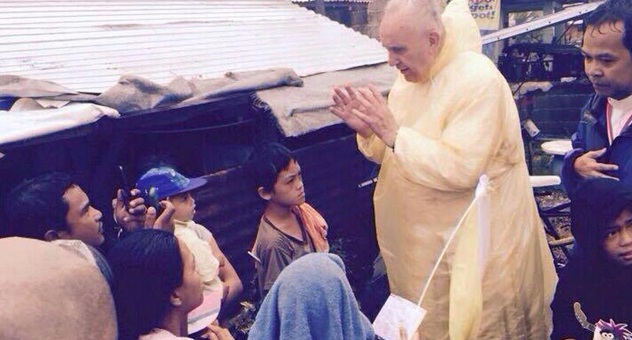
MANILA — Heeding the call of Pope Francis to help the poor and the children is a big task but not a hard one for the Aquino administration since this is already part of its program.
In a briefing Tuesday, Presidential Communications Operations Office (PCOO) Secretary Herminio Coloma Jr. said the Pontiff’s call “is consistent with what this administration is doing since day one.”
”It affirms the government’s priority emphasis on fighting poverty principally by anchoring all government programs on a platform of good governance and anti-corruption,” he said.
Coloma said the administration is “gratified that the Pope’s message was one that is very much similar or consistent with what this administration has been advocating from day one.”
“We find resonance in the Pope’s message and we are determined to affirm and live through concrete deeds — the message that the Pope gave during his visit,” he stressed.
Pope Francis, in his speech at Malacanang on January 16, 2015, said ensuring social justice and respect for human dignity is among the important things to look into to achieve national goals.
”The great biblical tradition enjoins on all peoples the duty to hear the voice of the poor. It bids us [to] break the bonds of injustice and oppression, which give rise to glaring, and indeed scandalous, social inequalities. Reforming the social structures, which perpetuate poverty and the exclusion of the poor first requires a conversion of mind and heart,” he said.
The Pontiff disclosed that Philippine bishops have requested that 2015 be considered the “Year of the Poor.”
”I hope that this prophetic summons will challenge everyone, at all levels of society, to reject every form of corruption which diverts resources from the poor, and to make concerted efforts to ensure the inclusion of every man and woman and child in the life of the community,” he added.
Relatively, Coloma said the government continues to exceed what it has achieved in terms of pro-poor programs among others.
He noted that for one, high school students who belong to the family-beneficiaries of the Department of Social Welfare and Development’s (DSWD) conditional cash transfer (CCT) program are now covered by the program.
”This is because of the empirical finding that those who are able to complete secondary education have greater prospects for employment and would potentially earn higher incomes — secondary school graduates rather than if they just finished elementary school,” he said.
Relatively, Coloma said DSWD’s books and other agencies involved in the CCT implementation are always available for those who have questions on the government’s CCT program.
He made the statement when asked about the scheduled Senate hearing on the alleged anomalies in the said poverty-alleviation program.
Coloma said the CCT is among the programs that received huge budget in line with the government’s bid for a more inclusive growth.
He said this program has been scrutinized not only by the government itself but by lawmakers during budget deliberations.
He said even multilateral agencies like the World Bank (WB) and other agencies such as the Millennium Challenge Corporation are monitoring the Philippines’ CCT program.
“Sa pagdaloy ng panahon, apat o limang taon na itong ini-implement, wala namang napapatunayang malawakang anomalya. Sa pagdaloy din ng panahon ay napapahusay at napapabuti pa ang pangangasiwa sa programang ito,” he added.
Under the 2015’s P2.606-trillion national budget, the CCT program has been allocated some P64.7 billion, higher by three percent year-on-year, and this will be used to help about 4.4 million poor households.
Government data show that for this year, about 50 percent of the two million beneficiaries will be lifted from survival to subsistence and about six percent or some 300,000 families will be able to transfer bring subsistence to self-sufficiency.